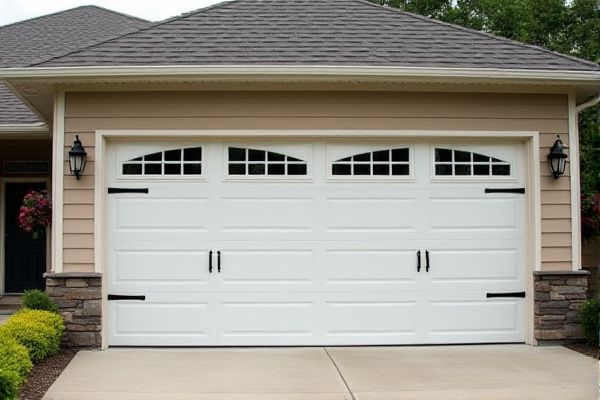
Insulated garage doors offer superior energy efficiency by reducing heat transfer and improving temperature regulation, while non-insulated doors may lead to higher energy costs and less comfort. Discover how choosing the right garage door can impact Your home's performance by reading the rest of this article.
Table of Comparison
| Feature | Insulated Garage Doors | Non-Insulated Garage Doors |
|---|---|---|
| Energy Efficiency | High - Reduces heat loss and cooling costs | Low - Poor thermal insulation |
| Soundproofing | Effective - Minimizes noise from outside | Poor - Allows more external noise |
| Durability | Enhanced - Thicker panels resist dents and damage | Less durable - Thinner material prone to dents |
| Cost | Higher initial investment | Lower upfront cost |
| Temperature Regulation | Better - Maintains stable garage temperature | Poor - Allows temperature fluctuations |
| Weight | Heavier due to insulation materials | Lighter and easier to operate |
| Maintenance | Requires less maintenance due to durability | May require frequent repairs |
| Environmental Impact | Improves energy efficiency, reduces carbon footprint | Less eco-friendly due to higher energy use |
Introduction: Insulated vs Non-Insulated Garage Doors
Insulated garage doors offer superior thermal efficiency, reducing heat loss and improving energy savings compared to non-insulated doors. These doors feature materials like polyurethane or polystyrene cores that provide enhanced durability and noise reduction. Your choice impacts overall home comfort and can lower utility bills during extreme weather conditions.
Key Differences Explained
Insulated garage doors feature a core of insulating material like polyurethane or polystyrene, providing enhanced thermal efficiency and noise reduction compared to non-insulated doors with hollow or single-layer construction. These doors help maintain consistent indoor temperatures, reduce energy costs, and offer better durability and structural stability. Choosing an insulated garage door can improve comfort and protect your garage contents from extreme weather, whereas non-insulated options are typically more affordable but less effective in temperature regulation.
Energy Efficiency and Insulation
Insulated garage doors provide superior thermal resistance, significantly reducing heat transfer compared to non-insulated doors, which helps maintain stable indoor temperatures. This energy efficiency lowers heating and cooling costs by minimizing energy loss, especially in climates with extreme temperatures. Non-insulated garage doors lack this thermal barrier, resulting in greater energy consumption to regulate temperature within the garage space.
Cost Comparison: Upfront and Long-Term
Insulated garage doors have a higher upfront cost, typically ranging from $800 to $2,500 compared to $300 to $900 for non-insulated options, but they provide significant energy savings by reducing heat loss and lowering heating and cooling bills over time. The long-term return on investment makes insulated doors more cost-effective, especially in climates with extreme temperatures, as they enhance temperature regulation and reduce wear on HVAC systems. Your choice impacts both initial expenses and ongoing energy efficiency, making insulated garage doors a valuable investment when considering lifetime costs.
Climate Considerations
Insulated garage doors provide superior thermal resistance, making them ideal for regions with extreme temperatures by reducing heat loss in winter and heat gain in summer. Non-insulated doors lack this barrier, which can lead to higher energy costs and fluctuating indoor temperatures in climates with harsh weather. In moderate climates, the energy efficiency gap is less noticeable, but insulated doors still contribute to better temperature regulation and overall comfort.
Noise Reduction Benefits
Insulated garage doors significantly reduce noise transmission by using dense materials such as polystyrene or polyurethane foam, which absorb sound waves and minimize external and internal noise. Non-insulated doors, typically made of thin steel or aluminum, lack this soundproofing layer, allowing more noise to pass through and increasing overall sound disturbance. Your choice of an insulated door enhances noise reduction, creating a quieter and more comfortable garage environment.
Durability and Strength
Insulated garage doors provide enhanced durability and strength due to their layered construction, which includes a layer of rigid foam insulation sandwiched between steel panels, improving impact resistance and structural integrity. Non-insulated garage doors typically consist of a single steel or aluminum panel, making them more prone to dents and damage from external forces. Choosing insulated doors ensures Your garage is better protected against weather-related wear and physical impacts, leading to longer-lasting performance and reduced maintenance.
Aesthetic and Design Options
Insulated garage doors offer a wider range of aesthetic and design options, including varied panel styles, window inserts, and finishes that maintain energy efficiency without compromising appearance. Non-insulated doors tend to have limited design versatility and often feature thinner materials, which can restrict customization and durability. You can enhance your home's curb appeal with insulated doors that combine style and functionality seamlessly.
Maintenance and Lifespan
Insulated garage doors require less frequent maintenance due to their enhanced durability and resistance to warping, cracking, and rust, which commonly affect non-insulated doors. Your insulated door can significantly extend its lifespan by maintaining structural integrity and reducing strain from temperature fluctuations, unlike non-insulated options that may deteriorate faster in harsh weather. Investing in an insulated garage door ultimately reduces long-term repair costs and keeps your garage environment more stable.
Which Garage Door Is Right for You?
Insulated garage doors offer superior thermal efficiency, reducing energy costs by maintaining stable indoor temperatures, making them ideal for homes with attached garages or climate control needs. Non-insulated doors provide a cost-effective solution with lighter-weight materials but lack the energy-saving benefits and noise reduction of insulated options. Choosing the right garage door depends on your budget, climate, and whether the garage is used as a workspace or storage area.
 homyna.com
homyna.com